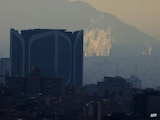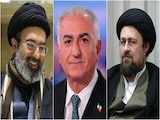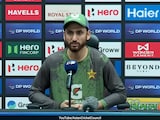New Delhi:
Vidya Charan Shukla, a Congressman by origin who changed parties, had a long and chequered political career but he will remain best known for his iron-fist handling of the media during the infamous Emergency.
Elected to Lok Sabha nine times, the first time as early as in 1957 from Mahasamund in the undivided Madhya Pradesh, Mr Shukla held key portfolios in the Union government including Communications, Parliamentary Affairs, Water Resources and External Affairs in various governments.
He was the son of illustrious Congressman and freedom fighter Pandit Ravishankar Shukla, the first Chief Minister of the re-organised Madhya Pradesh. His brother Shyama Charan Shukla was another veteran Congressman, who had served as Chief Minister of the state.
Despite a versatile career, Mr Shukla's role as Information and Broadcasting Minister during the Emergency days had got him some odium as propagandist for Indira Gandhi's government.
His ministry attracted adverse attention for the media censor policy during that period when freedom of speech was under attack.
The Justice Shah Commission of Inquiry which went into the Emergency excesses, had observed among other things that "During the Emergency some of these dramatis personae such as Bansi Lal, VC Shukla, Sanjay Gandhi exercised powers like medieval despots."
During the Emergency, he banned the songs of Kishore Kumar from All India Radio and Doordarshan because the singer once refused to perform at an Indian National Congress rally in Mumbai. However, to be fair to him, Mr Shukla stood by his decisions and owned them before the Shah Commission.
Mr Shukla graduated from Morris College Nagpur in 1951 and started Allwyn Cooper Private Ltd, which organised big-game safari and photo expeditions of wildlife in central Indian forests in addition to Manganese and Dolomite mining.
He joined the revolt against Rajiv Gandhi in the mid-80s and was one of the founders of Jan Morcha headed by VP Singh.
Later he became a minister in the National Front government of 1989-90 under VP Singh and switched allegiance to join the subsequent Chandrasekhar government to become External Affairs Minister.
Then he returned to Congress and became a minister in the PV Narasimha Rao government. Later he had a brief stint with the BJP before returning to the Congress.
Elected to Lok Sabha nine times, the first time as early as in 1957 from Mahasamund in the undivided Madhya Pradesh, Mr Shukla held key portfolios in the Union government including Communications, Parliamentary Affairs, Water Resources and External Affairs in various governments.
He was the son of illustrious Congressman and freedom fighter Pandit Ravishankar Shukla, the first Chief Minister of the re-organised Madhya Pradesh. His brother Shyama Charan Shukla was another veteran Congressman, who had served as Chief Minister of the state.
Despite a versatile career, Mr Shukla's role as Information and Broadcasting Minister during the Emergency days had got him some odium as propagandist for Indira Gandhi's government.
His ministry attracted adverse attention for the media censor policy during that period when freedom of speech was under attack.
The Justice Shah Commission of Inquiry which went into the Emergency excesses, had observed among other things that "During the Emergency some of these dramatis personae such as Bansi Lal, VC Shukla, Sanjay Gandhi exercised powers like medieval despots."
During the Emergency, he banned the songs of Kishore Kumar from All India Radio and Doordarshan because the singer once refused to perform at an Indian National Congress rally in Mumbai. However, to be fair to him, Mr Shukla stood by his decisions and owned them before the Shah Commission.
Mr Shukla graduated from Morris College Nagpur in 1951 and started Allwyn Cooper Private Ltd, which organised big-game safari and photo expeditions of wildlife in central Indian forests in addition to Manganese and Dolomite mining.
He joined the revolt against Rajiv Gandhi in the mid-80s and was one of the founders of Jan Morcha headed by VP Singh.
Later he became a minister in the National Front government of 1989-90 under VP Singh and switched allegiance to join the subsequent Chandrasekhar government to become External Affairs Minister.
Then he returned to Congress and became a minister in the PV Narasimha Rao government. Later he had a brief stint with the BJP before returning to the Congress.















